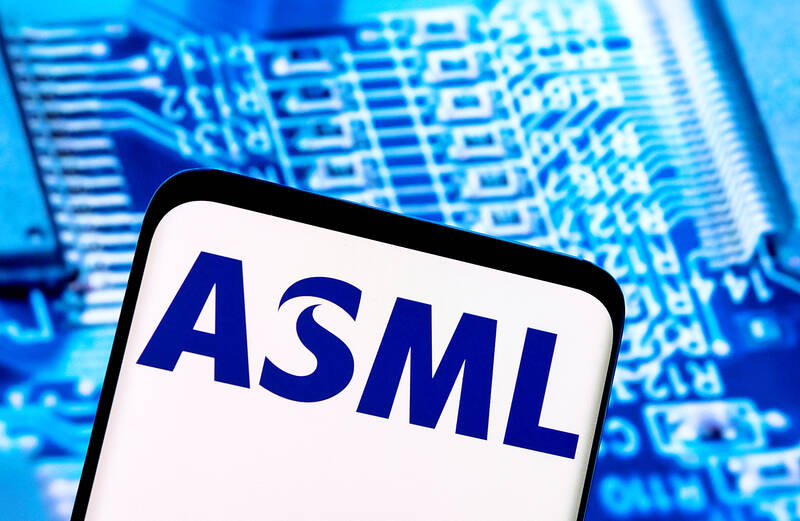Investors in chip stocks are facing a fresh gut check after a tepid outlook from key equipment supplier ASML Holding NV sparked a global rout in the sector.
Combined market value losses for an index of US-traded chipmakers plus the largest Asian stocks reached more than US$420 billion. Shares in ASML yesterday extended losses, falling 5 percent in Amsterdam, after plunging 16 percent the previous day.
The warning from Netherlands-based ASML halted a rally that had pushed a gauge of US-traded shares to a three-month high. Nvidia Corp sank nearly 5 percent on Tuesday in New York, after reaching a record close earlier this week on reduced concern over production issues with its newest artificial intelligence (AI) product.

Photo: Reuters
ASML’s shares on Tuesday tumbled by the most since 1998 after the manufacturer of the world’s most advanced chipmaking machines cut its outlook on sluggishness in areas beyond AI. It lowered the top end of its guidance range for next year’s total net sales to 35 billion euros (US$38.14 billion) from 40 billion euros.
While a weak forecast for next year was expected from ASML given slowness in non-AI applications as well as reduced spending by Intel Corp and other factors, “the magnitude of the correction is a negative surprise,” Citigroup Inc analyst Atif Malik wrote in a note.
Exacerbating the situation was the lack of accompanying color as the results were released mistakenly a day earlier than scheduled.
ASML published the release prematurely “due to a technical error,” it said in a statement.
The company was yesterday to hold a call with investors at 3pm in Amsterdam.
Tuesday’s collapse in the share price of ASML erased about 50 billion euros from the company’s market value. That places it among Europe’s five biggest single-day market capitalization wipeouts ever. It ranks alongside the plunges recorded by Nokia Oyj and Vodafone Group PLC when the Internet bubble burst some 25 years ago.
Losses in Asian trading yesterday were led by ASML peers including Tokyo Electron Ltd, which fell 9.2 percent, while Lasertec Corp, which makes equipment to inspect chips, lost 13.4 percent in Tokyo.
Shares of top foundry Taiwan Semiconductor Manufacturing Co (台積電), which is today to report third-quarter results, ended 2.34 percent lower in Taipei, while shares in Samsung Electronics Co and SK Hynix Inc closed down 2.46 percent and 2.18 percent respectively in Seoul.
Despite the market reaction, some investors see ASML’s woes as possibly specific to the Dutch company. AI demand remains brisk and Beijing’s efforts to revive its economy are seen helping a broader recovery.
“We believe chipmakers are strategically reducing orders for ASML, and this is negatively affecting ASML’s earnings,” Fibonacci Asset Management Global Pte chief executive officer Jung In-yun said.
Whether the driver is cost-cutting or other strategic reasons is unclear, he said, adding that stimulus from China might spur a rebound in chip demand.

Real estate agent and property developer JSL Construction & Development Co (愛山林) led the average compensation rankings among companies listed on the Taiwan Stock Exchange (TWSE) last year, while contract chipmaker Taiwan Semiconductor Manufacturing Co (TSMC, 台積電) finished 14th. JSL Construction paid its employees total average compensation of NT$4.78 million (US$159,701), down 13.5 percent from a year earlier, but still ahead of the most profitable listed tech giants, including TSMC, TWSE data showed. Last year, the average compensation (which includes salary, overtime, bonuses and allowances) paid by TSMC rose 21.6 percent to reach about NT$3.33 million, lifting its ranking by 10 notches

Popular vape brands such as Geek Bar might get more expensive in the US — if you can find them at all. Shipments of vapes from China to the US ground to a near halt last month from a year ago, official data showed, hit by US President Donald Trump’s tariffs and a crackdown on unauthorized e-cigarettes in the world’s biggest market for smoking alternatives. That includes Geek Bar, a brand of flavored vapes that is not authorized to sell in the US, but which had been widely available due to porous import controls. One retailer, who asked not to be named, because

SEASONAL WEAKNESS: The combined revenue of the top 10 foundries fell 5.4%, but rush orders and China’s subsidies partially offset slowing demand Taiwan Semiconductor Manufacturing Co (TSMC, 台積電) further solidified its dominance in the global wafer foundry business in the first quarter of this year, remaining far ahead of its closest rival, Samsung Electronics Co, TrendForce Corp (集邦科技) said yesterday. TSMC posted US$25.52 billion in sales in the January-to-March period, down 5 percent from the previous quarter, but its market share rose from 67.1 percent the previous quarter to 67.6 percent, TrendForce said in a report. While smartphone-related wafer shipments declined in the first quarter due to seasonal factors, solid demand for artificial intelligence (AI) and high-performance computing (HPC) devices and urgent TV-related orders

MINERAL DIPLOMACY: The Chinese commerce ministry said it approved applications for the export of rare earths in a move that could help ease US-China trade tensions Chinese Vice Premier He Lifeng (何立峰) is today to meet a US delegation for talks in the UK, Beijing announced on Saturday amid a fragile truce in the trade dispute between the two powers. He is to visit the UK from yesterday to Friday at the invitation of the British government, the Chinese Ministry of Foreign Affairs said in a statement. He and US representatives are to cochair the first meeting of the US-China economic and trade consultation mechanism, it said. US President Donald Trump on Friday announced that a new round of trade talks with China would start in London beginning today,